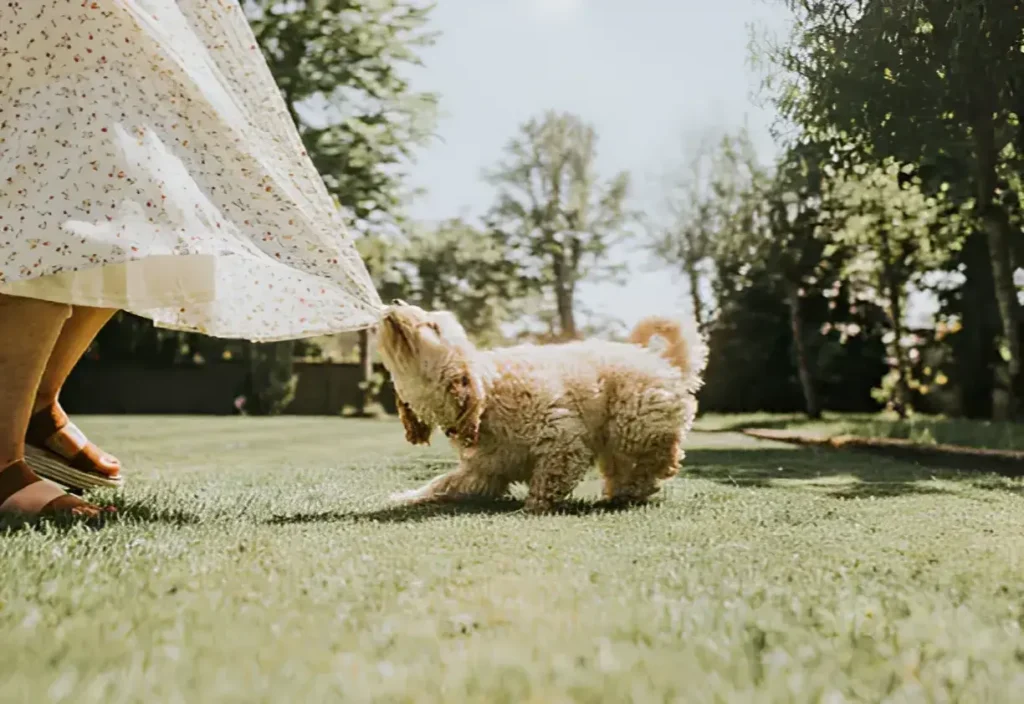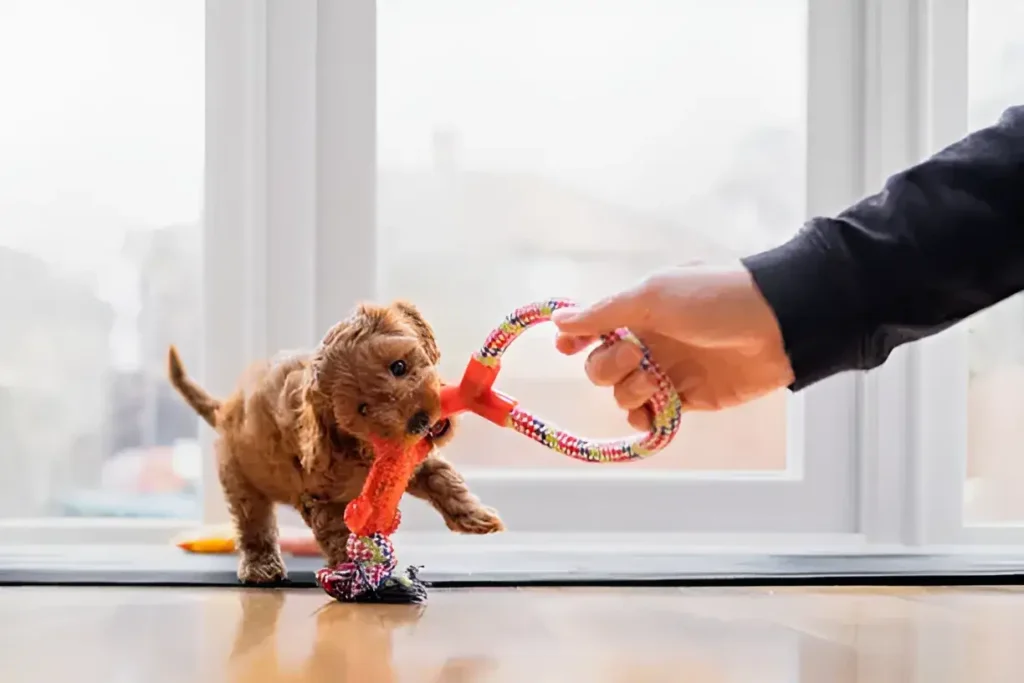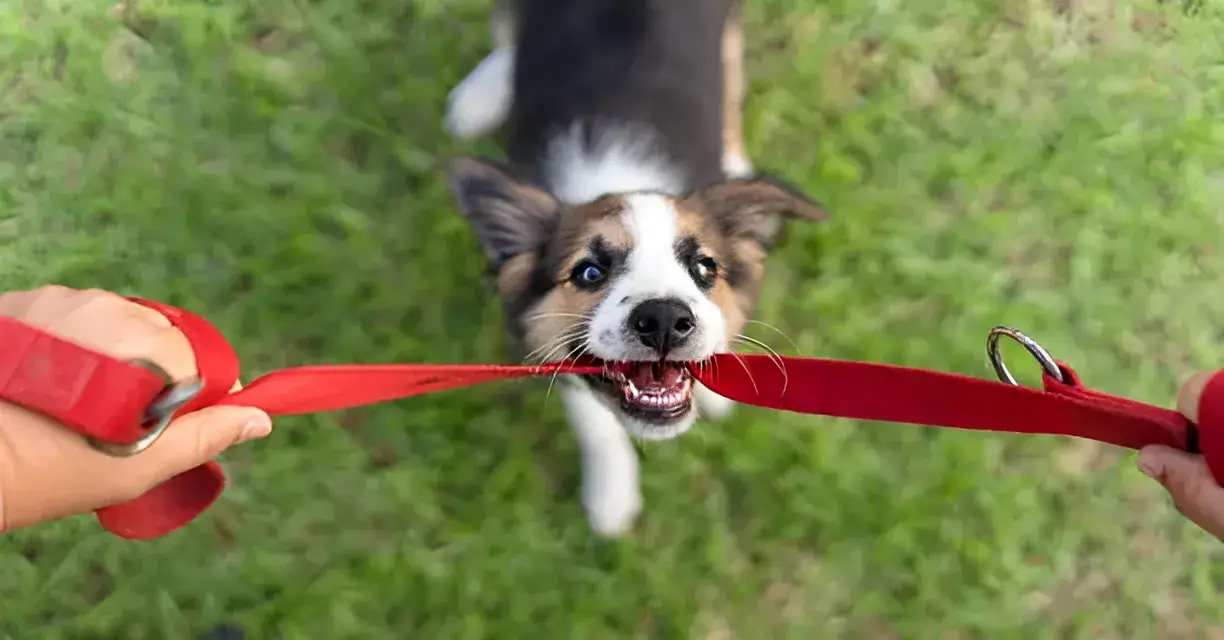Your puppy’s playful nips and roughhousing are normal, but they need guidance. Here’s what to do: 1) Say “Ouch!” in a high-pitched tone to signal pain. 2) Immediately stop playing and leave the room briefly. With consistent training, understanding, and the help of socialization, you’ll transform those wild play sessions into positive bonding experiences.
Why Puppies Get Overexcited During Play
Exploration: Puppies use their mouths and bodies to learn about their world. Biting and playful wrestling are their ways of exploring textures, strengths, and boundaries.
Teething: Sore gums drive them to chomp on anything for relief, including your hands and feet!
No Boundaries: Young puppies haven’t learned how hard is too hard yet. They need our help to understand what’s appropriate play.
Bursts of Energy: All that puppy fuel needs an outlet! Without enough exercise and mental stimulation, a puppy is likely to get overexcited and turn play into chaotic roughhousing.
Step-by-Step Intervention
“Ouch!”: When play hurts, give a high-pitched yelp like another puppy would. This signals “that hurts!” in their language.
Disengage: Stop playing immediately. Turn away, leave the room briefly, or gently put your puppy in a short timeout area. Don’t scold, just calmly remove yourself and the fun.
Redirect: Offer a chew toy, start a short training session to focus their energy, or engage in a game of fetch.
Praise the Good: The moment they focus on the toy or training, offer lots of praise and positive reinforcement!
Preventing Rough Play Before It Starts

Short and Sweet Play Sessions: Frequent, short bursts of play prevent overexcitement, helping your puppy stay within their limits.
Watch for Warning Signs: Is your puppy getting too bouncy, mouthy, overly zoomie, or starting to growl? Pause play before things escalate and redirect their energy.
Harness that Energy: Structured walks, fetch sessions, and puzzle toys will tire them out in healthy ways, reducing the likelihood of rough play.
The Importance of Socialization
Puppy play dates with other well-mannered dogs are crucial for teaching your puppy how to play appropriately. They learn valuable social skills and bite inhibition from interacting with other dogs. Look for puppy socialization classes or arrange playdates with dogs you know and trust.
Troubleshooting Common Challenges
“My puppy only gets rougher when I say ‘ouch!'” Some puppies get more excited by high-pitched noises. Try a firm “No!” and disengage instead.
“My puppy seems to enjoy the timeout – what now?” Try a different type of timeout, like putting them in a designated puppy space with a chew toy for a few minutes.
“How do I know if my puppy is just playing or being aggressive?” Aggressive puppies have stiff bodies, snarling, sustained growls, and show their teeth. Playful pups are loose, wiggly, and might have playful barks or growls.
Key Things to Remember

- Patience is Key: Puppies don’t learn overnight. Be consistent and gentle in your training approach.
- Breed Matters: Understand your puppy’s breed tendencies and adjust your expectations accordingly.
- Age is a Factor: Manage expectations as your puppy ages. Teething phases or bursts of adolescent energy may mean revisiting these steps.
When to Seek Professional Help
If you notice any of the following, it’s best to reach out to a certified dog trainer or behaviorist:
- Intense Roughness: Your puppy’s bites consistently break skin or leave bruises.
- Unsettling Body Language: Play sessions involve sustained snarling, stiff posture, and bared teeth even when you intervene.
- No Response to Training: Despite your efforts, your puppy shows no improvement or seems to get worse with rough play.
Conclusion
While a bit of roughhousing is natural for puppies, it’s important to guide them towards healthy play habits. By understanding their natural instincts, teaching them boundaries, and providing plenty of positive outlets for their energy, you’ll help your furry friend develop into a well-adjusted, happy adult dog.
The photo featured below the post headline is Credit: Rawlstock/istockphoto
I hope you find this post helpful and informative. If Yes’ feel free to share it with your friends!
Frequently Asked Question
How long does it take to teach a puppy not to play rough?
Every puppy learns at a different pace. With consistency, most puppies see significant improvement within a few weeks.
Should I ignore my puppy when it plays rough?
Briefly ignoring them sends a clear message that rough play ends playtime. Don’t ignore them for extended periods, but provide a short, effective timeout.
Is my puppy playing or being aggressive?
Playful puppies have loose, wiggly bodies. Aggression tends to involve stiff posture, bared teeth, and sustained growling.
Do puppies grow out of rough play?
Most puppies calm down with age and consistent training. However, how much they mellow out depends on breed tendencies and how well they learn bite inhibition.
Is my puppy aggressive or just playing?
Playful puppies have loose, bouncy bodies and may playfully bark. Aggression involves stiff posture, teeth baring, and sustained growling.
How do I calm my puppy down from playing?
Short timeouts, offering a chew toy for redirection, or engaging in a brief training session can help settle an overexcited puppy.
At what age do puppies stop play fighting?
There’s no set age. With training and maturity, most puppies greatly reduce rough play by around a year old.
Why is my puppy playing too rough with other dogs?
Puppies need to learn how to play appropriately with other dogs. If they get overexcited or don’t understand another dog’s signals, they might play too rough.
Why is my puppy playing too rough with older dogs?
Puppies may not recognize an older dog’s signals to take a break. It’s important to monitor these interactions and intervene if the older dog is getting overwhelmed.
Why is my puppy playing too rough at night?
Puppies often have a burst of energy in the evening (the “zoomies”). Schedule a play session right before bedtime to help them get that energy out.
Should I let my puppy play with toys that squeak?
Squeaky toys can be fun, but for puppies prone to rough play, they might increase arousal. Opt for calmer toys during training.
My puppy gets rougher when I ignore them. What should I do?
Try a short timeout in a designated space with a calming chew toy instead of just ignoring them.

